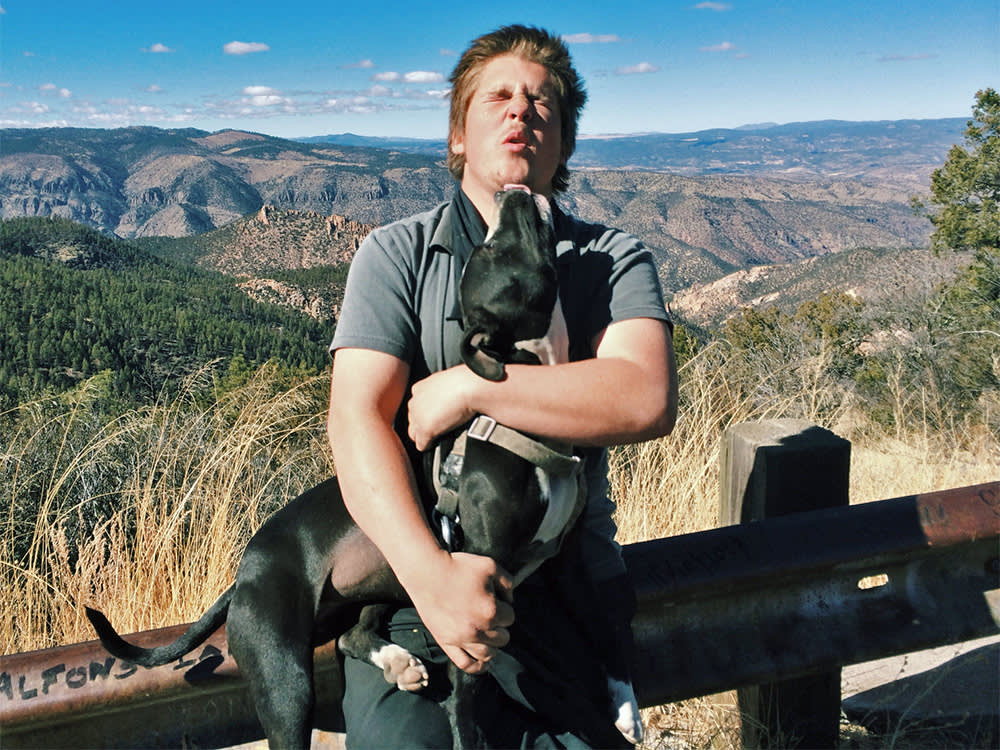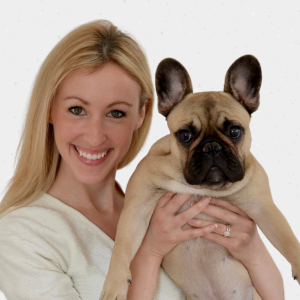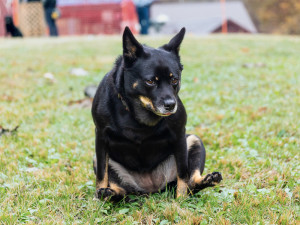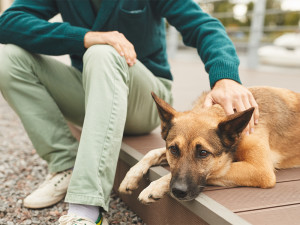Why Does My Dog Smell Like Fish?
It’s not a very pleasant odor, to say the least.

Share Article
In This Article:
Possible Reasons Your Dog Smells Like Fish How to Treat Your Dog’s Fishy Smell When Should You Contact Your Vet? Preventing Fishy Smells Removing Fishy Odor From Your Home Frequently Asked Questions
Imagine this: It’s finally Friday night after a grueling week and you’re settling in for some well-deserved relaxation with your dog. As you pet their head and peruse Netflix, a pungent, fishy odor wafts your way. You instinctively check the trash for any forgotten discarded seafood, only to realize the source is your beloved canine companion.
Sometimes our pups pick up less-than-pleasant odors that leave us wrinkling our noses and even gasping for air. But where does this aquatic aroma come from? A few different things can cause your dog to smell like fish, from their diet and dental hygiene to their skin and right beneath their tail. Learn how to identify and address the root cause so both you and your canine can get back to stink-free Friday nights (and every night for that matter).
Possible reasons your dog smells like fish
Figuring out what’s causing this odor is probably your number-one priority, because very few people can enjoy a binge-watching session with a rotten seafood smell lingering in the air (if you can, more power to you). Here are some potential reasons why your dog smells fishy.
Anal gland secretions
To try to get to the bottom (literally) of your dog’s fishy odor, you may reluctantly sniff them to find where it’s coming from — and that’s when you realize it’s coming from their tail end. Yep, your dog’s butt smells like fish. This likely has to do with their anal glands and it’s a common culprit for a fishy odor.
“These glands, located on either side of your dog’s anus, secrete a fishy-smelling fluid that is a part of their natural scent-marking mechanism,” says Dr. Sabrina Kong, veterinarian and staff writer at WeLoveDoodles. “However, if these glands become impacted or infected, the scent can become overwhelmingly strong and noticeable.”
Essentially, these sacs are supposed to empty when your dog poops. When dogs have trouble emptying their anal sacsopens in new tab, it can cause smelly secretions to build. This can happen if the dog is overweight or has a skin condition called seborrhea, which makes their glands produce too much oil. When these secretions build up, it can lead to infections, irritation, and a rank, fishy odor. If this is the cause, you may notice your dog scooting, licking or biting at their butt, or displaying other signs of discomfort.
Dental disease
If you’ve ruled out their butt, check the other end and take a whiff of their breath. If their pearly whites aren’t looking so white, it’s probably giving them horrible breath and can even lead to irreversible dental disease.
“Poor oral hygiene can lead to periodontal disease, associated with a foul odor that can sometimes be mistaken for a fishy smell,” Dr. Kong says.
Urinary issues
If your dog’s fishy odor seems to be emanating from their genital area, urinary issues could be the cause. Urinary tract infections (UTIs) or other urinary issues can sometimes produce an unpleasant scent that resembles fish. These conditions can cause bacterial overgrowth or other abnormalities in the urinary tract and lead to that unusual odor. Dogs with incontinence issues (the loss of bladder control) may develop a fishy smell due to urine leakage or improper bladder emptying.
Skin infections
Skin infections are another potential culprit behind that fishy smell coming from your pooch. These infections can occur when bacteria or yeast decide to throw a party on your dog’s skin, leading to an unpleasant odor. Factors like trapped moisture in skin folds, allergies, or skin barrier issues can create the perfect environment for these pesky microbes to thrive. Conditions like seborrhea, which causes excessive oil production, can also add to the stink.
Diet
Your dog’s diet can play a significant role in their overall smell. Certain foods, especially those with high fish content or Omega-3 fatty acids, can impart a fishy scent to your dog’s skin and coat. Plus, if your pup has a sensitive stomach or digestive issues, it could lead to malabsorption or improper digestion of nutrients, resulting in an unusual smell emerging from their body.
How to treat your dog’s fishy smell
It’s time to get rid of that fishy smell once and for all. But where do you start? Try these steps to get your dog smelling back to their old self again.
1. Uncover the cause of the smell
Figuring out what’s causing your dog’s odor is the first step. And sometimes sniffing all over their body isn’t the most effective (or enjoyable) way to do that.
“Treating your dog’s fishy smell involves addressing the root cause,” Dr. Kong explains. “If anal glands are the issue, a vet may need to express these glands. If the scent originates from dental problems, a professional dental cleaning might be necessary, along with establishing a routine dental care regimen at home. Dietary adjustments may also be recommended based on your dog’s specific needs.”
Ultimately, a veterinarian is your go-to person if your dog’s stinking up the place. They can help find the root cause and recommend the best treatment.
2. Regularly bathe your dog
Give your canine companion a good scrub-down with a gentle dog shampoo to help remove any lingering odors. Make sure to use lukewarm water and avoid over-bathing, as it can strip your dog’s skin of its natural oils and potentially exacerbate the issue. Treat bath time as a bonding experience and reward your pup with some tasty treats afterward to make it a positive experience for both of you.
3. Use odor-neutralizing products
Invest in some pet-friendly odor-neutralizing sprays or wipes to tackle any persistent smells between baths. These products are specifically formulated to target and eliminate pet odors, leaving your dog smelling fresh and clean. Just be sure to choose products that are safe for dogs and avoid anything with harsh chemicals or artificial fragrances that could irritate their skin.
4. Brush their teeth
Maintaining good dental hygiene is essential for your dog’s overall health and can also help combat that fishy smell. Regularly brushing your dog's teeth with a canine toothbrush and toothpaste can help prevent dental issues like gum disease, which can contribute to bad breath and unpleasant odors. Plus, it’s an excellent way to bond with your pup and keep their pearly whites sparkling clean.
5. Dry your dog thoroughly
After bath time or any water-related activities, make sure to dry your dog thoroughly to prevent moisture from getting trapped in their fur and creating a musty smell. Use a clean towel to gently towel-dry your dog, paying special attention to areas where moisture tends to linger, such as their ears and underbelly. You can also use a pet-safe blow dryer on a low, cool setting to speed up the drying process and ensure your pup stays comfortable and smelling fresh.
When should you contact your vet?
If your efforts to figure out where the smell is coming from are coming up short and your dog is only getting smellier, you might be wondering if it’s time to bring in the pros. The answer here is definitely yes.
“It’s time to contact a vet when the fishy smell is persistent, accompanied by visible discomfort in your dog, such as scooting, excessive licking of the anal area, signs of dental distress, or any other symptoms of illness,” Dr. Kong says. “These could be indicators of an underlying health issue that requires professional attention.”
Preventing fishy smells from your dog
Chances are you don’t want to deal with this fishy smell again, so prevention will be key to having a happy, healthy, and fresh-smelling dog.
“Preventing the fishy smell primarily involves regular maintenance of your dog's health: ensuring proper anal gland function through a diet with adequate fiber, maintaining good dental hygiene, and regular check-ups with your veterinarian,” Dr. Kong explains.
If you’re able to do these three things, it’s not likely that the fishy smell will rear its ugly head again. If it does, your veterinarian can help you tweak any dietary elements or recommend dental productsopens in new tab to keep both their head and their tail smelling fresh.
Removing fishy odor from your home
As much as we may try to prevent fishy smells coming from our dogs, sometimes it just happens. When it does, it can leave our homes smelling less than ideal. Anal gland leakage in particular can be really difficult to get out, so it’s essential to have some go-to supplies on hand to remove the odor.
“As for removing the odor from your home, thoroughly cleaning your dog’s bedding, favorite lounging areas, and toys with pet-safe cleaning products can help,” Dr. Kong says. “Air purifiers and keeping your living space well-ventilated can also assist in eliminating persistent odors.”
Ultimately, any fishy odor coming from your dog is likely something you should address, regardless of whether their mouth or butt is to blame. If you work with a veterinarian to find and treat the root cause and employ prevention strategies to keep the stink at bay, you, your pup, and your home will thank you.
FAQs (People also ask):
What foods help dogs express glands?
Certain high-fiber foods, such as pumpkin, sweet potatoes, and green beans can help bulk up your dog’s stool, making it easier for their anal glands to empty naturally during bowel movements. Adding probiotics to your dog’s diet can also promote healthy digestion, potentially reducing the need for manual expression.
What breeds of dogs need their glands expressed?
While any dog breed can require gland expression, certain breeds are more prone to gland issues due to their anatomy. Breeds with small body sizes or short, squat builds, such as Bulldogs, Cocker Spaniels, and Basset Hounds, are often predisposed to anal gland problems.
Can dogs clear their own glands?
In some cases, dogs may naturally express their anal glands during bowel movements or through normal activity, like walking or running. However, if your dog is not able to empty their glands effectively on their own, they may require manual expression by a veterinarian or groomer.
How do you express anal glands at home?
Expressing anal glands at home should only be done by experienced pet parents under the guidance of a veterinarian. It involves applying gentle pressure on the glands located on either side of the anus to release their contents. However, improper technique or excessive pressure can cause injury or infection, so it's crucial to consult a professional before attempting this procedure at home.
References:
Anal Sac Disease in Dogs and Catsopens in new tab

Courtney Elliott
Courtney Elliott, a proud Cleveland native living in Manhattan, blends her decade of writing and editing expertise with her unshakable devotion as a pet parent to her French Bulldog, Gus. When she’s not at her desk, you’ll find her frolicking in Central Park or engrossed in a good book at a local coffee shop.
Related articles
![French bulldog puppy looking scared at vet]()
10 Things to Ask at Your First Vet Visit
There are no stupid questions — well, when it comes to your dog’s health.
![A black dog with a tilted head looks attentively at the camera while sitting in grass.]()
Is My Dog’s Poop Normal?
From bloody poop to diarrhea—all your dog’s poop problems explained.
![feeding black dog rice water to help relieve diarrhea]()
Vet-Approved Diarrhea Treatments
Shudder. It happens to all of us.
![Constipated German Shepherd being comforted by its owner]()
Gut Feelings: Dogs Get Constipated Too
What to do when your pup can’t poop.
![Pomeranian stands in front of a yellow bowl of homemade probiotic yogurt]()
Are Probiotics Actually Something Your Dog Needs?
Time for a (literal) gut check from four experts.








